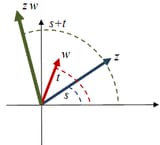Anonymous
7/3/2025, 4:35:45 AM No.17810503
What is the deepest statement that you’ve ever read? For me:
e^(pi*i)+1=0 - I have no idea what it means, and I’m pretty sure no one else does, either, but it is the most profound thing that I have ever seen in my life.
e^(pi*i)+1=0 - I have no idea what it means, and I’m pretty sure no one else does, either, but it is the most profound thing that I have ever seen in my life.
Replies:


